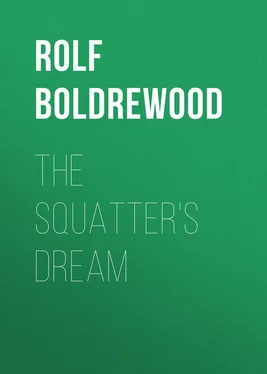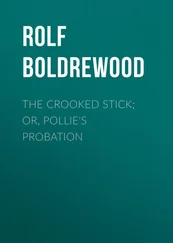Rolf Boldrewood - The Squatter's Dream
Здесь есть возможность читать онлайн «Rolf Boldrewood - The Squatter's Dream» — ознакомительный отрывок электронной книги совершенно бесплатно, а после прочтения отрывка купить полную версию. В некоторых случаях можно слушать аудио, скачать через торрент в формате fb2 и присутствует краткое содержание. Издательство: Иностранный паблик, Жанр: foreign_antique, foreign_prose, на английском языке. Описание произведения, (предисловие) а так же отзывы посетителей доступны на портале библиотеки ЛибКат.
- Название:The Squatter's Dream
- Автор:
- Издательство:Иностранный паблик
- Жанр:
- Год:неизвестен
- ISBN:нет данных
- Рейтинг книги:4 / 5. Голосов: 1
-
Избранное:Добавить в избранное
- Отзывы:
-
Ваша оценка:
- 80
- 1
- 2
- 3
- 4
- 5
The Squatter's Dream: краткое содержание, описание и аннотация
Предлагаем к чтению аннотацию, описание, краткое содержание или предисловие (зависит от того, что написал сам автор книги «The Squatter's Dream»). Если вы не нашли необходимую информацию о книге — напишите в комментариях, мы постараемся отыскать её.
The Squatter's Dream — читать онлайн ознакомительный отрывок
Ниже представлен текст книги, разбитый по страницам. Система сохранения места последней прочитанной страницы, позволяет с удобством читать онлайн бесплатно книгу «The Squatter's Dream», без необходимости каждый раз заново искать на чём Вы остановились. Поставьте закладку, и сможете в любой момент перейти на страницу, на которой закончили чтение.
Интервал:
Закладка:
It happened in this wise: – Looking over the papers one evening he descried mention of a lot of store sheep then on their way to town, and on a line of road which would bring them near to Gondaree.
“This lot would suit us very well, Mr. Redgrave,” said he, looking up from his paper, and then taking a careful transcript in his pocket-book of their ages, numbers, and sexes. “Seven thousand altogether – five thousand four and six tooth wethers, with a couple of thousand ewes; if they are good-framed sheep, with decent fleeces, and the ewes not too old, they would pay well to buy on a six months’ bill. We could take the wool off and have them fat on these Bimbalong plains by the time the bill comes due.”
“How about seeing them?” quoth Jack; “they may be Queensland sheep, with wool about half an inch long. They often shear them late on purpose when they are going to start them on the road. ‘They’re a simple people,’ as Sam Slick says, those Queenslanders.”
“Of course I must see them,” answered M‘Nab. “I never buy a pig in a poke; but they will be within a hundred miles of us in a week, and I can ride across and see them, and find out their idea of price. Shearing is always an expensive business, and the same plant and hands will do for double our number of sheep, if we can get them at a price.”
M‘Nab carried out his intention, and, falling across the caravan in an accidental kind of way, extracted full particulars from the owner, a somewhat irascible old fellow, who was convoying in person. He returned with a favourable report. The sheep were good sheep; they had well-grown fleeces, rather coarse; but that did not matter with fattening sheep; they were large and would make good wethers when topped up. The ewes were pretty fair, and not broken-mouthed. They wanted eleven shillings all round, and they were in the hands of Day and Burton, the stock agents.
“Now, I’ve been thinking,” said Mr. M‘Nab, meditatively, “whether it wouldn’t pay for me to run down to Melbourne by the mail – it passes to-morrow morning – and arrange the whole thing with Day and Burton. Writing takes an awful long time. Besides, I might knock sixpence a head off, and that would pay for my coach-fare and time, and a good deal over. Seven thousand sixpences are one hundred and seventy-five pounds. Thirty pounds would take me there and back, inside of three weeks.”
“That will only allow you two days in town,” said Jack, “and you’ll be shaken to death in that beastly mail-cart.”
“Never mind that,” said the burly son of the “black north,” stretching his sinewy frame. “I can stand a deal of killing. Shall I go?”
“Oh, go by all means, if you think you can do any good. I don’t envy you the journey.”
M‘Nab accordingly departed by the mail next morning, leaving Jack to carry on the establishment in his absence, a responsibility which absorbed the whole of his waking hours so completely that he had no time to think of anything but sheep and shepherds, with an occasional dash of dingo. One forenoon, as he was waiting for his midday meal, having ridden many a mile since daylight, he descried a small party approaching on foot which he was puzzled at first to classify. He soon discovered them to be aboriginals. First walked a tall, white-haired old man, carrying a long fish-spear, and but little encumbered with wearing apparel. After him a gin, not by any means of a “suitable age” (as people say in the case of presumably marriageable widowers), then two lean, toothless old beldames of gins staggering under loads of blankets, camp furniture, spare weapons, an iron pot or two, and a few puppies; several half-starved, mangy dogs followed in a string. Finally, the whole party advanced to within a few paces of the hut and sat solemnly down, the old savage sticking his spear into the earth previously with great deliberation.
As the little group sat silently in their places bolt upright, like so many North American Indians, Jack walked down to open proceedings. The principal personage was not without an air of simple dignity, and was very different of aspect from the dissipated and debased beggars which the younger blacks of a tribe but too often become. He was evidently of great age, but Jack could see no means of divining whether seventy years or a hundred and twenty would be the more correct approximation. His dark and furrowed countenance, seamed with innumerable wrinkles, resembled that of a graven image. His hair and beard, curling and abundant, were white as snow. His eye was bright, and as he smiled with childish good humour it was apparent that the climate so fatal to the incisors and bicuspids of the white invader, had spared the larger proportion of his grinders. On Jack’s desiring to know his pleasure, he smiled cheerfully again, and muttering “baal dalain,” motioned to the younger female, as if desiring her to act as interpreter. She was muffled up in a large opossum-rug which concealed the greater part of her face; but as she said a few words in a plaintive tone, and with a great affectation of shyness, Jack looking at her for the first time recognized the brilliant eyes and mischievous countenance of his old acquaintance Wildduck.
“So it’s you?” he exclaimed, much amused, upon which the whole party grinned responsively, the two old women particularly. “And is this your grandfather, and all your grandmothers; and what do you want at Gondaree?”
“This my husband, cooley belonging to me – ole man Jack,” explained Wildduck, with an air of matronly propriety. “Ole man Jack, he wantim you let him stay long a wash-pen shearing time. He look out sheep no drown. Swim fust-rate, that ole man.”
“Well, I’ll see,” replied Jack, who had heard M‘Nab say a black fellow or two would be handy at the wash-pen – the sheep having rather a long swim. “You can go and camp down there by the water. How did you come to marry such an old fellow, eh, Wildduck?”
“My fader give me to him when I picaninny. Ippai and Kapothra, I s’pos. Black fellow always marry likit that. White girl baal marry ole man, eh, Mr. Redgrave?”
“Never; that is, not unless he’s very rich, Wildduck. Here’s a fig of tobacco. Go to the store and get some tea and sugar, and flour.”
Old man Jack and his lawful but by no means monogamous household, were permitted to camp at the Wash-pen Creek, in readiness for the somewhat heavy list of casualties which “throwing in” always involves. A sheep encumbered with a heavy fleece, and exhausted by a protracted immersion, often contrives to drown as suddenly and perversely as a Lascar. Nothing short of the superior aquatic resources of a savage prevents heavy loss occasionally. So Mr. Redgrave, averse in a general way, for reasons of state, to having native camps on the station, yet made a compromise in this instance. A few sheets of bark were stripped, a few bundles of grass cut, a few pieces of dry wood dragged up by old Nanny and Maramie, and the establishment was complete. A short half-hour after, and there was a cake baked on the coals, hot tea in a couple of very black quart pots, while the odours of a roasted opossum, and the haunch of wallaby, were by no means without temptation to fasting wayfarers with unsophisticated palates. As old man Jack sat near the cheerful fire, with his eyes still keen and roving, wandering meditatively over the still water and the far-stretching plain, as the fading eve closed in magical splendour before his unresponsive gaze, how much was this poor, untaught savage to be pitied, in comparison with a happy English labourer, adscriptus glebæ of his parish – lord of eleven babes, and twelve shillings per week, and, though scarce past his prime, dreading increased rheumatism and decreasing wages with every coming winter!
Читать дальшеИнтервал:
Закладка:
Похожие книги на «The Squatter's Dream»
Представляем Вашему вниманию похожие книги на «The Squatter's Dream» списком для выбора. Мы отобрали схожую по названию и смыслу литературу в надежде предоставить читателям больше вариантов отыскать новые, интересные, ещё непрочитанные произведения.
Обсуждение, отзывы о книге «The Squatter's Dream» и просто собственные мнения читателей. Оставьте ваши комментарии, напишите, что Вы думаете о произведении, его смысле или главных героях. Укажите что конкретно понравилось, а что нет, и почему Вы так считаете.












